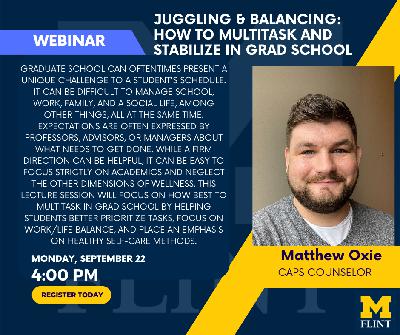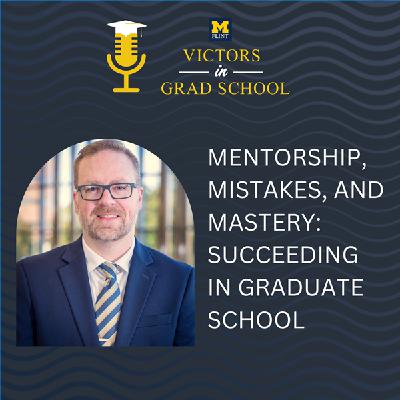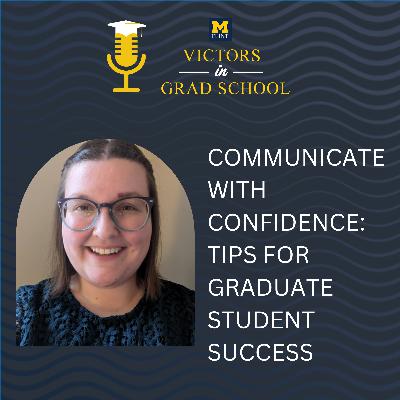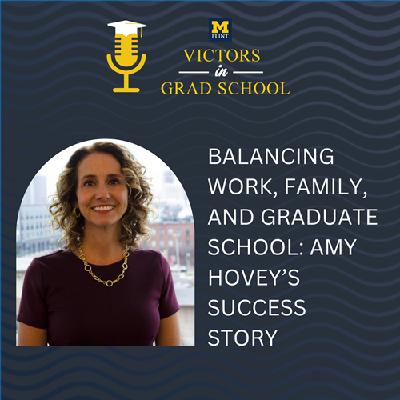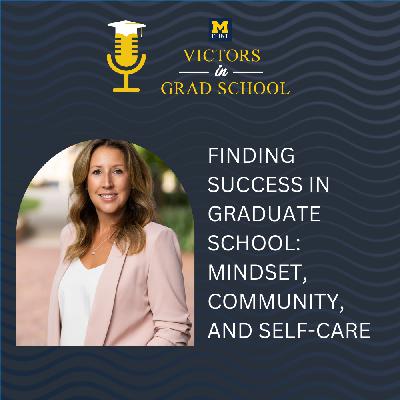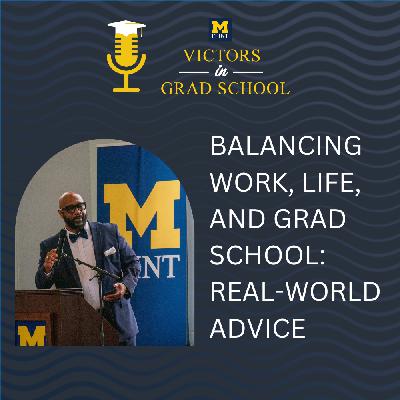Juggling Responsibilities: Key Tips for Graduate Student Success
Description
Graduate school is a journey often described as a juggling act, and for good reason. In the recent episode "Juggling & Balancing – How to Multitask and Stabilize in Grad School" of the Victors in Grad School podcast, Dr. Christopher Lewis and Matthew Oxie delve into what it really takes to find success amidst the constant pull of academic, personal, and professional responsibilities.
Understanding Grad School Stress
Dr. Lewis opens the conversation by normalizing the stress that comes with graduate school. As he puts it, "There is a lot that you are going to be tossing in the air… Sometimes we succeed, sometimes we fail. And that's okay as long as you learn along the way." This sets a compassionate tone for exploring the sources of grad school stress—ranging from academic pressure and family obligations to financial concerns and planning for life after graduation.
Matthew Oxie, a licensed counselor with CAPS at UM-Flint, provides further insight, citing research that graduate students are two to six times more likely to experience anxiety and depression than their undergraduate peers. Stressors like career planning, clinical rotations, commuting, and social obligations all play a role, often overlapping and compounding each other.
The Eight Dimensions of Wellness
A major highlight from the episode is the discussion of the Eight Dimensions of Wellness, which include physical, emotional, environmental, financial, occupational, social, intellectual, and spiritual health. Matthew encourages listeners to use these as both a diagnostic tool and a growth map—reminding us that thriving in one area can help offset struggles in another.
Self-Care vs. Self-Soothing: What's the Difference?
Perhaps the most impactful segment is Matthew's exploration of self-care versus self-soothing. He stresses that while activities like watching Netflix or having a treat are important for unwinding, true self-care is intentional and structured—it's about setting boundaries, routines, and practicing deliberate actions that nourish long-term wellbeing.
Strategies That Work
The episode wraps up with practical advice: prioritize tasks, intentionally schedule downtime, set boundaries (like keeping work email off your phone), and leverage campus resources such as the rec center or counseling services. Matthew and Dr. Lewis also encourage graduate students—no matter if they're on-campus or online—to "get involved" in community and social activities.
If you're feeling the weight of multiple responsibilities or struggling with balance in grad school, this episode is a must-listen. You'll come away with not just empathy for your situation, but tangible strategies for thriving—one step, and one intentional action, at a time.
Ready to find your balance and become a victor in graduate school? Listen to the full episode for more insights and encouragement!
TRANSCRIPT
Dr. Christopher Lewis [00:00:01 ]:
Welcome to Victors in Grad School where we have conversations with students, alumni and experts about what it takes to find success in graduate school.
Dr. Christopher Lewis [00:00:11 ]:
Thanks so much for being here today. I am Dr. Lewis, Director of Graduate Programs here at the University of Michigan, Flint. Really excited to have you here today. And as always, you know, I am excited that we're going to be talking about a really important topic because as you go through graduate school, you definitely are going to be doing a lot of juggling. There is a lot of things that you are going to be tossing in the air and you're going to be trying to keep going. And balancing all of that as you're going through graduate school is something that all of us that have gone through graduate school before have had to work through. Sometimes we succeed, sometimes we fail.
Dr. Christopher Lewis [00:00:53 ]:
And that's okay as long as you learn along the way. And today we've got Matthew Oxy with us. And Matthew is one of our counselors in our CAPS office. And I love our partnership with CAPS because we always talk about amazing topics that will help all of us to be able to learn something a little bit new. So I'm going to turn it over to him to walk us through and talk to us about this important topic. Thanks Matt.
Matthew Oxie [00:01:19 ]:
Excellent. Yeah, no problem. Thank you for having me again, Dr. Lewis.
Matthew Oxie [00:01:22 ]:
Hello.
Matthew Oxie [00:01:22 ]:
Like Dr. Lewis said, my name is Matthew Oxie. I'm a licensed professional counselor with the Counseling and Psychological Services, the CAPS department here at U of M Flint. I do. Like I said, how does that make you feel? Therapy oftentimes Today we are going to talk about how to multitask and stabilize while in graduate school through effective self care strategies, time management tactics and ways you can get involved both on campus and within your own communities to help promote your own well being. So a couple disclaimers beforehand. This is not going to be direct therapeutic advice. I advise if this is something you're seeking, you can either find services at caps, which we'll talk about here soon, or services within a community, or you're already connected.
Matthew Oxie [00:02:09 ]:
But just as a little word of advice. This is not like formal therapeutic advice. The next thing this lecture may not be a full hour. I am, I like public speaking. I'm very good at it. But I'm also kind of a fast talker. So if you guys have any questions, feel free to shout them out in the chat and I will get to them. Dr.
Matthew Oxie [00:02:26 ]:
Lewis, you as well, if you have anything, please let me know. But I guess before we really get started, I want to start with something kind of controversial guys might not be aware of this.
Matthew Oxie [00:02:38 ]:
Right.
Matthew Oxie [00:02:39 ]:
Grad school can be stressful. Shocking, I know, but it's important to recognize this before we get too deep into the nitty gritty of what we want to talk about with multitasking here. So the types of stressors graduate students face. I've got my speaker notes down here, so it looks like I'm not looking at the screen. I've got my speaker notes down here. I'm not checking my phone or anything like that. So correct me if I'm wrong, Dr. Lewis, but University of Michigan Flint currently offers over 30 graduate programs.
Matthew Oxie [00:03:10 ]:
Actually, I was going to say over 50. Over 50.
Matthew Oxie [00:03:13 ]:
Wow.
Matthew Oxie [00:03:14 ]:
I was looking at the. The course selector. Not the course selector like the major selection thing, like the academic programs. I only counted about 35. So you got over 50, we've got over 50. So that furthers the point that across the University of Michigan Flint campus, graduate students are a significant portion of our university's makeup. Right. So this is something that's important to talk about.
Matthew Oxie [00:03:38 ]:
Obviously, if you're listening to this, you're likely a graduate student at U of M Flint. So you understand that now common sources of graduate student stress. Graduate student student stress. Someday I'll be able to get that combination of words out of my mouth. Now, there is actually an index for this. There is the Graduate Stress Inventory. It was made in the mid-90s and it's been revised over the decades. And it asks a series of questions related to environmental, academic, and then family and monetary stressors as well.
Matthew Oxie [00:04:10 ]:
And you can see those are listed here. Academic stress, family issues, interpersonal relationships and financial stress. Additionally, though a little bit more specific to graduate school or I guess in addition to the gsi, we have career, right? Career placement, career planning. What are we going to do after graduate school as well as research and teaching. I know it is a very important part of some programs that you write a thesis, for example, or you have teaching experience or you're expected to teach or run a class or a lab.
Matthew Oxie [00:04:47 ]:
Right.
Matthew Oxie [00:04:47 ]:
Just depends on what you're studying. There are other problems that are more broad that can amplify some of these stressors, Other concerns that might be totally unrelated to graduate school, but can make it harder to get through poor physical health or disabilities. If we talk about something like a physical disability, chronic pain, and even sometimes increased fatigue, all of these things can, as we've said, amplify the stress of what is above mental and emotional struggles.
Matthew Oxie [00:05:22 ]:
Right.
Matthew Oxie [00:05:23 ]:
Preexisting mental health struggles or mental health diagnoses. Or mental health struggles and diagnoses that crop up as a result of graduate school. We'll talk about that here on the next slide. So I don't want to get too, too much into the mental and emotional stuff right this second. Sleep can amplify issues. How many of us don't get enough sleep in graduate school? I'm sure quite a few of us.
Matthew Oxie [00:05:47 ]:
Right?
Matthew Oxie [00:05:47 ]:
That constant, seemingly chronic exhaustion can lead to again, further feelings of stress and then finally age. This one, while Empirical is also a little more anecdotal. Age can play a role in increasing the potency of some of these stressors.
Matthew Oxie [00:06:06 ]:
Right?
Matthew Oxie [00:06:06 ]:
I want you to think about it. Old

